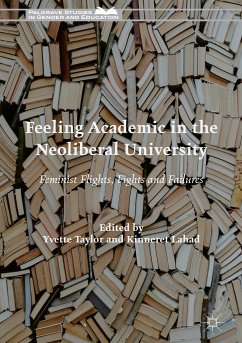
Routledge Handbook of the Sociology of Higher Education (eBook, PDF)
Versandkostenfrei!
Sofort per Download lieferbar
43,95 €
inkl. MwSt.
Weitere Ausgaben:

PAYBACK Punkte
22 °P sammeln!
Higher education has come under increasing public scrutiny in recent years, assailed with demands for greater efficiency, accountability, cost reduction, and, above all, job training. Drawing upon examples from across the world, with an emphasis on Anglo-American higher-education systems, this handbook employs sociological approaches to address these pressing concerns. The second edition is thoroughly updated and adds several new chapters to shed further light on the transformations wrought by the interrelated processes of massification, vocationalization, and marketization that have swept thr...
Higher education has come under increasing public scrutiny in recent years, assailed with demands for greater efficiency, accountability, cost reduction, and, above all, job training. Drawing upon examples from across the world, with an emphasis on Anglo-American higher-education systems, this handbook employs sociological approaches to address these pressing concerns. The second edition is thoroughly updated and adds several new chapters to shed further light on the transformations wrought by the interrelated processes of massification, vocationalization, and marketization that have swept through universities in the wake of neoliberal reforms introduced by governments since the 1980s.
The handbook explores recent developments in higher-education systems and policy as well as the everyday experiences of students and staff and ongoing problems of inequality and diversity within universities. In doing so, the chapters address a number of current issues concerning the legitimacy of higher-educational credentials, from the continuing debate regarding traditional pedagogies and the role of universities in social class reproduction to more recent concerns about standards in mass systems.
Collectively, this handbook demonstrates that the sociology of higher education has the potential to play a leadership role in improving the myriad higher-education systems around the world that are now part of an interrelated set of subsystems, replete with both persistent problems and promising prospects. This book is therefore necessary reading for a variety of stakeholders within academia as well as professionals and policy-makers interested in understanding higher education and the acute challenges it faces.
The handbook explores recent developments in higher-education systems and policy as well as the everyday experiences of students and staff and ongoing problems of inequality and diversity within universities. In doing so, the chapters address a number of current issues concerning the legitimacy of higher-educational credentials, from the continuing debate regarding traditional pedagogies and the role of universities in social class reproduction to more recent concerns about standards in mass systems.
Collectively, this handbook demonstrates that the sociology of higher education has the potential to play a leadership role in improving the myriad higher-education systems around the world that are now part of an interrelated set of subsystems, replete with both persistent problems and promising prospects. This book is therefore necessary reading for a variety of stakeholders within academia as well as professionals and policy-makers interested in understanding higher education and the acute challenges it faces.
Dieser Download kann aus rechtlichen Gründen nur mit Rechnungsadresse in A, B, BG, CY, CZ, D, DK, EW, E, FIN, F, GR, HR, H, IRL, I, LT, L, LR, M, NL, PL, P, R, S, SLO, SK ausgeliefert werden.













